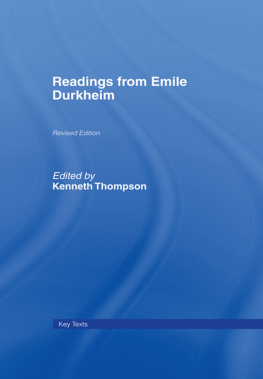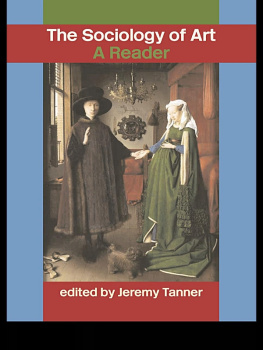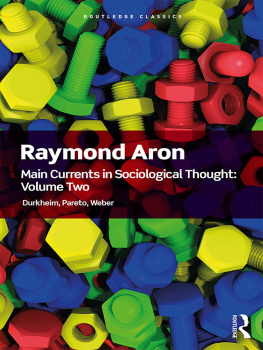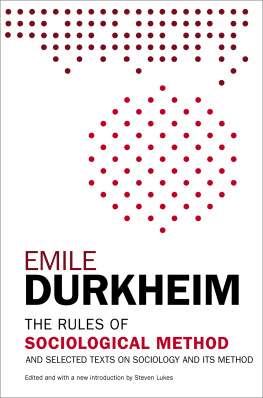READINGS FROM EMILE DURKHEIM
Revised Edition
Emile Durkheim is regarded as a founding father of sociology, and is studied in all basic sociology courses. This handy textbook provides an excellent collection of the key passages from Durkheim's major works and successfully encapsulates the core of his sociology.
With this accessible text, Kenneth Thompson has effectively filled a gap that previously existed in the literature available on Durkheim, by providing an outstanding collection of modern and reliable translations from works such as De la division du travail social (1893), Les rgles de la mthode sociologique (1895), Le suicide (1897) and Les formes lmentaires de la vie rligieuse (1912). Offering both in-depth coverage and useful reference, this text provides an indispensable aid to those seeking to gain access to Durkheim's writings.
The enduring popularity of Readings from Emile Durkheim has prompted this revised edition, which will continue to appeal to students of sociology across all different levels.
Kenneth Thompson has been based at the Open University in the United Kingdom since 1970. He has held visiting professorships in recent years at Yale University and the University of California, Los Angeles.
KEY TEXTS
Series Editor: PETER HAMILTON
The Open University, Milton Keynes
Designed like Key Ideas, to complement Key Sociologists, this series provides concise and original selections from the works of sociologists featured in Key Sociologists. The selections, made by the authors of the Key Sociologists volumes, will enable the books to be used as part of a teaching package connecting study of the essential texts to introductory analyses of the sociologists' works.
READINGS FROM TALCOTT PARSONS
PETER HAMILTON, The Open University, Milton Keynes
READINGS FROM THE FRANKFURT SCHOOL
TOM BOTTOMORE, Professor of Sociology, University of Sussex
READINGS FROM EMILE DURKHEIM, REVISED EDITION
KENNETH THOMPSON, Faculty of Social Science, The Open University, Milton Keynes
READINGS FROM EMILE DURKHEIM
Revised Edition
Edited by KENNETH THOMPSON
For Clare
First published in 1985 by Ellis Horwood Ltd
and Tavistock Publications Ltd
Simultaneously published in the USA and Canada
by Routledge
29 West 35th Street, New York, NY 10001
This revised edition first published in 2004.
Routledge is an imprint of the Taylor & Francis Group
This edition published in the Taylor & Francis e-Library, 2005.
To purchase your own copy of this or any of Taylor & Francis or Routledge's collection of thousand of eBook please go to www.eBookstore.tandf.co.uk.
2004 Kenneth Thompson
All rights reserved. No part of this book may be reprinted or reproduced or utilised in any form or by any electronic, mechanical, or other means, now known or hereafter invented, including photocopying and recording, or in any information storage or retrieval system, without permission in writing from the publishers.
British Library Cataloguing in Publication Data
A catalogue record for this book is available from the British Library
Library of Congress Cataloging in Publication Data
A catalog record for this book has been requested
ISBN 0-203-33714-X Master e-book ISBN
ISBN - (Adobe eReaderFormat)
ISBN: 0-415-34912-5 (hbk)
ISBN: 0-415-34913-3 (pbk)
Contents
KENNETH THOMPSON has been based at the Open University in the United Kingdom since 1970. He has held visiting professorships in recent years at Yale University and the University of California, Los Angeles. In 2002 he was appointed to the Executive Committee of the International Sociological Association, and has served as President of its Research Committee on Sociological Theory He is editor of Routledge's The Making of Sociology series, including The Early Sociology of Culture (2003) and The Early Sociology of Management and Organizations (2003).
His recent publications include: Emile Durkheim (Routledge, revised edition 2002); Moral Panics (Routledge, 1998); The Uses of Sociology (ed. with P. Hamilton, Blackwell, 2002).
Series Editor's Foreword
The series of KEY TEXTS volumes is designed to both introduce the student to the most important work of the Key Sociologists, and to provide representative selections of their writings for all readers. Because the selection of readings contained in KEY TEXTS volumes complements the treatment of the Key Sociologists volumes, the two together provide indispensable aids to study and research.
Kenneth Thompson's Readings from Emile Durkheim is a comprehensive complement to his earlier and much acclaimed Emile Durkheim (Ellis Horwood/Tavistock, 1982) in the Key Sociologists series. But it is no mere compilation of material which could be gained from a number of other sources. For Dr Thompson, ably assisted by Margaret Thompson, has prepared new translations of the selections from the central elements of Durkheim's oeuvre: The Divison of Labour in Society (1893) The Rules of Sociological Method (1895), and Suicide (1897). Although widely used, the existing translations have long been recognized to be problematic transcriptions of Durkheim's ideas into English, which reveal more perhaps about the intellectual climate for which they were prepared than they do in exposing the full flavour and range of his thinking. In some cases, newer translations of fragments of the work have been published, but it is a distinct asset to the present work that it contains such an extensive selection of material specifically translated for this volume. The Thompsons have published a number of important translations of French sociology (not least from those highly influenced by the Durkheimian school, but also from Durkheim's important predecessor, Auguste Comte). Their work has played an important part in making available to the English-speaking reader a more complete and faithful picture of crucial elements in the development of French sociological thought. This volume thus represents a further stage in that process of the communication and accurate transposition of ideas, theories and concepts from one cultural tradition to another.
Why read Durkheim (or any other sociologist, for that matter) in the original, rather than relying on secondary analyses? The question may seem to be rather more easy to answer than it in fact proves to be, when unpacked a little. The conventional response has always been that it is intellectually valuable to know how the ideas were in fact presented, in order that they might be better understood. It has been traditional to claim that reading Suicide, for example, has inspirational value, in helping the student bond more closely with the sociology discipline he or she studies. An alternative view aboundedand is still not uncommonthat the reading of the sociological classics is an indispensable part of the intellectual socialization of anyone interested in the discipline. Finally, and perhaps least valuably, there was the convention that reading fragments of the classics constituted a sort of selective exampling of certain key ideas in the sociological canon. The fact that this might imply reading the material out of context was thought to be of little importancethe crucial thing was to be exposed to the material, and therefore to have allowed the intellectual osmosis from sociological classic to reader to have had an opportunity to take place.







